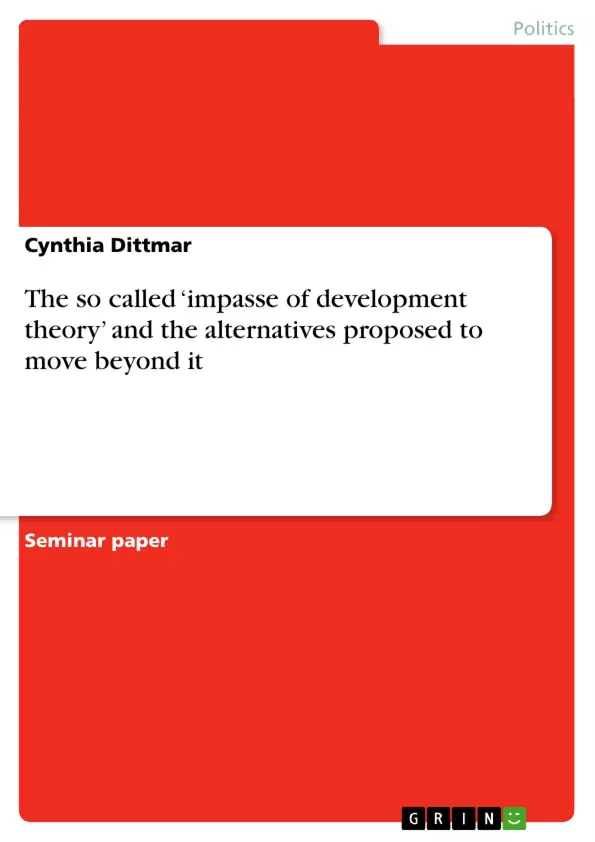In the mid 1980s development studies experienced a crisis, the often called impasse of de-velopment theory and policy (Schuurmann 1993). The reasons can be found on the level of development thinking and of “real-world changes and problems” (Simon 2003: 6). Devel-opment thinking got stuck in a cul-de-sac as both grand meta-narratives of development the-ory – Modernisation theory and radical Marxist approaches – lost their hegemony: radical alternative theories, based on Marxist and neo-Marxist political economy were discredited by the collapse of socialism. Modernisation theory, based in neoclassical economics did not seem to deliver many benefits as economic growth turned out to produce more ecological, social and economical problems than it solved (ibid.). It became clear that growth and the neo-liberal agenda with its structural adjustment programs (SAP) in the 1980s and 1990s was not necessarily connected to other development goals like employment creation, reduc-tion of inequality and poverty or the provision of basic needs.
The acceleration of globalisation and with it the questioning of the nation state as a “trusted point of reference” (Schuurman 2000: 7) of development studies intensified the crisis of de-velopment theory. Moreover new theoretical approaches like feminism, post modernism and post colonialism, and the growing recognition of heterogeneity of the third world, challenged development studies and theory even more (Schuurman 1993).
There have been two major reactions to the impasse of development theory and policy. The first reaction was the search for development alternatives with the intention of reforming and redefining the goals of development. The second reaction, post development thinking, was more radical as it rejects development as a whole.
However, development studies and practice survived the impasse and is back on the agenda: “a flourishing industry centred on social capital and social development has arisen in the World Bank, the UNDP and other multilateral institutions” (Hart 2001: 649). This paper aims to review alternative development (section 2) and post development (section 3), and analyses which contributions have helped to overcome the impasse.
Inhaltsverzeichnis (Table of Contents)
- Introduction - The impasse of development studies
- Alternative Development
- Alternative vs. Mainstream development - the case of the feminist empowerment approach
- Post Development
- Conclusion
Zielsetzung und Themenschwerpunkte (Objectives and Key Themes)
This paper aims to provide a critical review of alternative development and post-development thinking in response to the "impasse of development theory and policy" experienced in the mid-1980s. The paper will examine how these alternative approaches have sought to address the limitations of mainstream development paradigms.
- The Crisis of Development Theory and Policy
- Alternative Development Approaches
- Post-Development Critique
- The Role of Feminism in Development
- The Interplay of Mainstream and Alternative Development
Zusammenfassung der Kapitel (Chapter Summaries)
Introduction - The impasse of development studies: This chapter introduces the "impasse" in development theory and policy that emerged in the mid-1980s. It explores the limitations of both modernization theory and radical Marxist approaches, highlighting the failures of economic growth to address social and ecological problems. The chapter also discusses the growing influence of globalization and critiques from feminist, postmodern, and postcolonial perspectives.
Alternative Development: This chapter examines the concept of alternative development, exploring its diverse approaches and unifying features. It delves into critiques of alternative development, particularly focusing on the feminist empowerment approach and its potential for both progress and limitations.
Schlüsselwörter (Keywords)
The key terms and concepts explored in this paper include: development theory, impasse, alternative development, post-development, feminist empowerment, mainstream development, globalization, structural adjustment programs (SAPs), participation, poverty, sustainability, and critical sensibilities.
- Quote paper
- Cynthia Dittmar (Author), 2008, The so called ‘impasse of development theory’ and the alternatives proposed to move beyond it, Munich, GRIN Verlag, https://www.grin.com/document/131930



